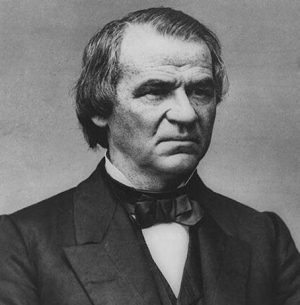Andrew Johnson Death
Andrew passed away on July 31, 1875 at the age of 66 in Elizabethton, Tennessee, United States. Andrew's cause of death was stroke.
When did Andrew Johnson die?
July 31, 1875How did Andrew Johnson die? What was the cause of death?
StrokeHow old was Andrew Johnson when died?
66Where did Andrew Johnson die? What was the location of death?
Elizabethton, Tennessee, United States
Andrew Johnson Birthday and Date of Death
Andrew Johnson was born on December 29, 1808 and died on July 31, 1875. Andrew was 66 years old at the time of death.
Birthday: December 29, 1808
Date of Death: July 31, 1875
Age at Death: 66
Is Andrew Johnson's father, Jacob Johnson, dead or alive?
Jacob Johnson's information is not available now.
Is Andrew Johnson's mother, Mary McDonough, dead or alive?
Mary McDonough's information is not available now.
Andrew Johnson's sister :
- Elizabeth Donough
Andrew Johnson's brother :
- William Donough
Andrew Johnson - Biography
Andrew Johnson was the 17th President of the United States, serving from 1865 to 1869. Johnson became president as he was vice president at the time of President Abraham Lincoln's assassination. A Democrat who ran with Lincoln on the National Union ticket, Johnson came to office as the Civil War concluded. The new president favored quick restoration of the seceded states to the Union. His plans did not give protection to the former slaves, and he came into conflict with the Republican-dominated Congress, culminating in his impeachment by the House of Representatives. The first American president to be impeached, he was acquitted in the Senate by one vote.
Johnson implemented his own form of Presidential Reconstruction – a series of proclamations directing the seceded states to hold conventions and elections to reform their civil governments. When Southern states returned many of their old leaders, and passed Black Codes to deprive the freedmen of many civil liberties, Congressional Republicans refused to seat legislators from those states and advanced legislation to overrule the Southern actions. Johnson vetoed their bills, and Congressional Republicans overrode him, setting a pattern for the remainder of his presidency.
Johnson opposed the Fourteenth Amendment, which gave citizenship to former slaves. In 1866, Johnson went on an unprecedented national tour promoting his executive policies, seeking to destroy his Republican opponents. As the conflict between the branches of government grew, Congress passed the Tenure of Office Act, restricting Johnson's ability to fire Cabinet officials. When he persisted in trying to dismiss Secretary of War Edwin Stanton, he was impeached by the House of Representatives, and narrowly avoided conviction in the Senate and removal from office. After failing to win the 1868 Democratic presidential nomination, Johnson left office in 1869.
Johnson returned home after the special session concluded. In late July, convinced some of his opponents were defaming him in the Ohio gubernatorial race, he decided to travel there to give speeches. He began the trip on July 28, and broke the journey at his daughter Mary's farm near Elizabethton, where his daughter Martha was also staying. That evening he suffered a stroke, but refused medical treatment until the next day, when he did not improve and two doctors were sent for from Elizabethton. He seemed to respond to their ministrations, but suffered another stroke on the evening of July 30, and died early the following morning at the age of 66.
President Grant had the "painful duty" of announcing the death of the only surviving past president. Northern newspapers, in their obituaries, tended to focus on Johnson's loyalty during the war, while Southern ones paid tribute to his actions as president.








